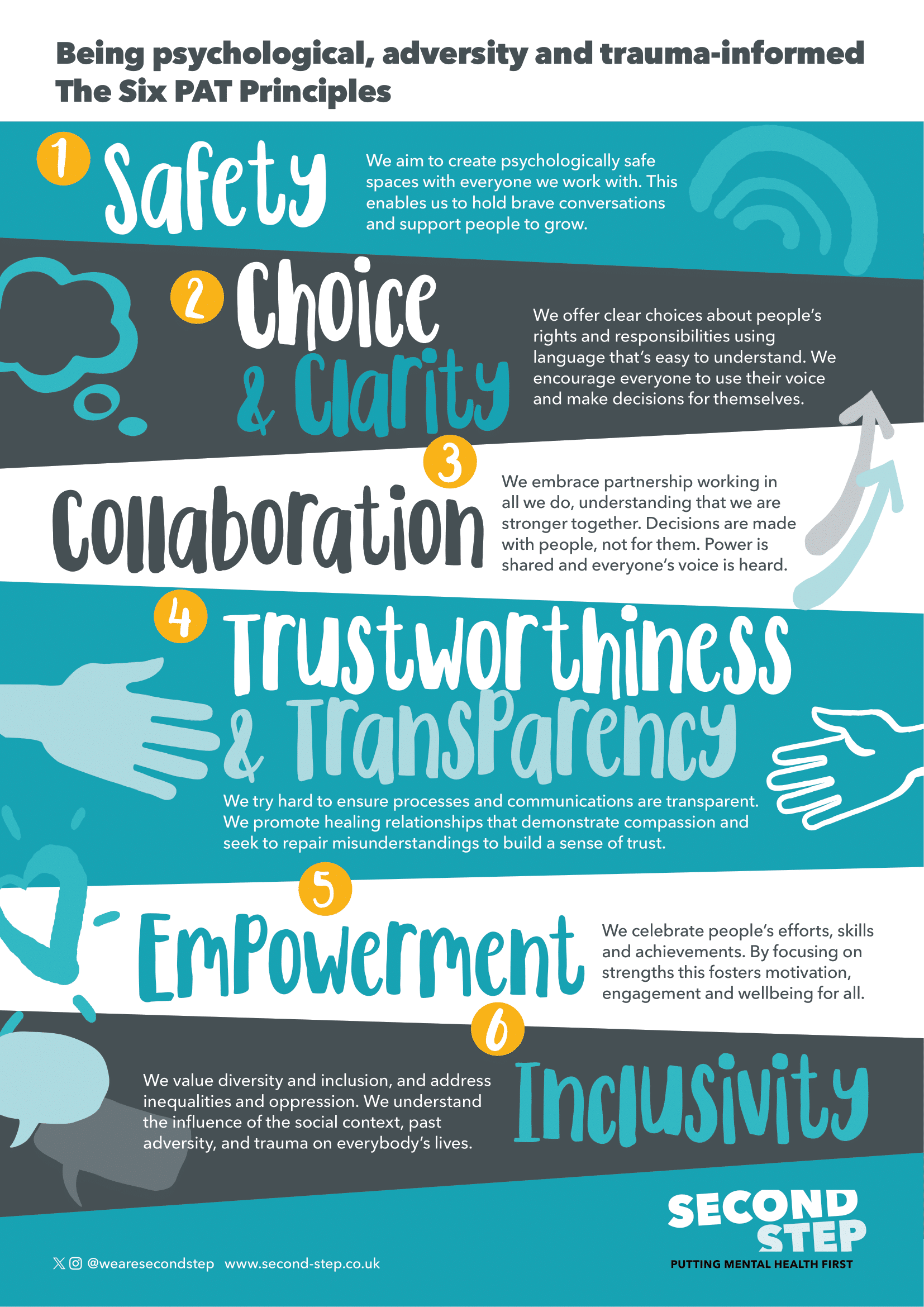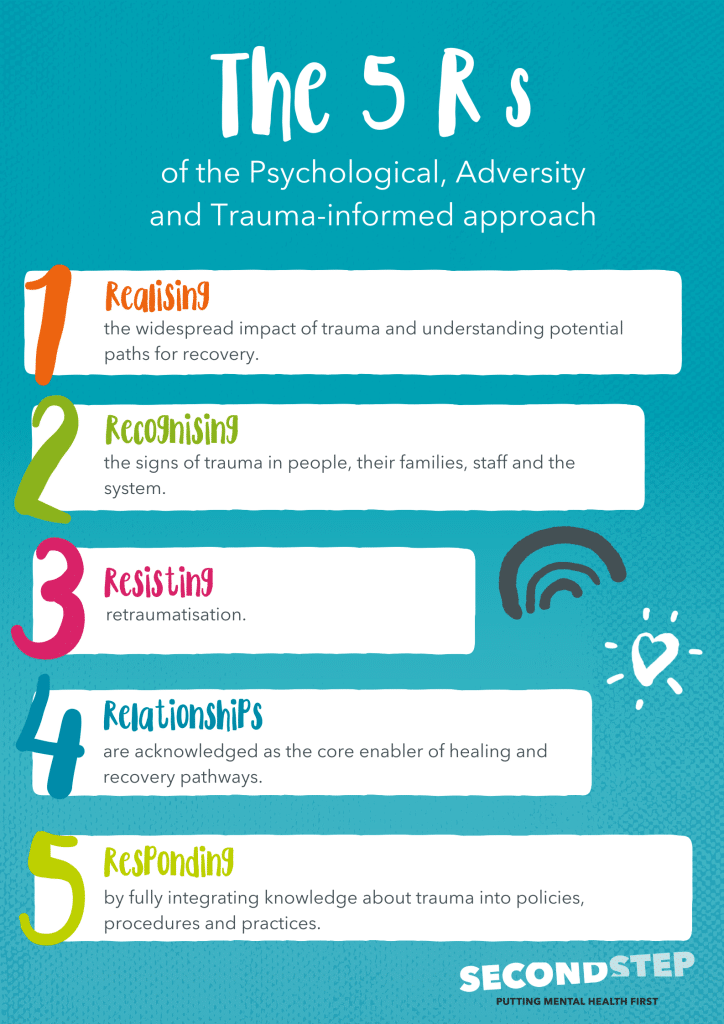Becoming Psychological, Adversity and Trauma-Informed (PAT)
As humans, we all have a story to tell. The things that happen in our lives shape and affect us all to a greater or lesser extent. Without realising, we adapt to our surroundings and the people we meet, by acting in ways to best meet our needs. These adaptations continue to guide our interactions in the here and now of our everyday lives.
On this page you will find information and links about Second Step's work towards becoming Psychological, Adversity and Trauma-informed (PAT-informed) as well as other useful resources about understanding trauma and becoming PAT-informed.
If you're discovering us for the first time and would like to know more about our work and why we've chosen to prioritise a PAT approach, click here to find out why being PAT-informed is so important for us.
Or, if you're looking for specific information about trauma and adversity, visit this page: what is trauma and adversity?
To discuss Second Step's PAT work or for any other PAT-related queries, please contact Jo Davies, Head of Psychology at Second Step:
What does Psychological, Adversity and Trauma-informed mean?
"We are invested in understanding the stories of people’s lives, believing in the remarkable resilience of humans to survive, thrive and grow beyond experiences of adversity and trauma. As an organisation we are motivated to partner with other organisations to share our learning to action systemic change which deepens our sense of purpose and meaning. We aspire to become known as a trauma-informed system leader within the South-West region"
Second Step PAT Strategy 2024
When people are going through difficult things and are struggling with their mental health, it is common for others to focus on 'what is wrong', such as a diagnosis, a symptom, or another label. While these things can be helpful, they don't tell the whole story.
Being Psychological, Adversity and Trauma-informed (PAT-informed) refers to being interested in 'what has happened' to someone, their story and meaning of experiences, rather than focusing on 'what is wrong'.
We are all the product of our experiences. We adapt ourselves to navigate challenges throughout our lives. Sometimes, we encounter challenges that are difficult to cope with because they are so distressing, frightening or confusing. We often refer to experiences like this as trauma.
Definition of trauma:
“Experiences that cause intense physical & psychological stress reactions. It can refer to a single event, multiple events that are experienced as threatening or harmful, that have lasting adverse effects on the individual’s physical, social, emotional and spiritual wellbeing”
Samhsa , 2014
The word trauma is often associated with big scale traumatic experiences, e.g. war or physical attack, and perhaps validated with a medical diagnosis, e.g. Post Traumatic Stress Disorder (PTSD). But trauma isn't limited to events like these and someone doesn’t need a label of PTSD to experience impact from trauma . In fact, trauma can affect anyone.
Unfortunately, people's experiences of trauma and adversity are often minimised and misunderstood by society. But this can be very invalidating for people when trying to connect with others or access services.
As well as one-off events, trauma can result from a series of ongoing experiences which build up over time. E.g. childhood trauma and trauma within relationships are two of the most common sources of trauma.
Trauma can also be caused and compounded by the social world around us and negative influences of power which can give rise to collective trauma, for example, experiences of racism, sexism and inequality.
These challenges can lead to complex ways of surviving, like substance use (e.g. alcohol or drugs) or contradictory interpersonal behaviours (e.g. avoiding relationships with others due to worries about feeling abandoned).
This is why being PAT-informed in the way we work with and support people is so important – By building trust and a sense of safety with people, we can help them tell their story which gives us clues about how they experience themselves, others and the world. It can help us understand the challenges they face and why they present or interact with us in certain ways.
Find out more about trauma on our What is trauma and adversity page.
"I never thought I'd be able to live independently"
How Step Together in Somerset embeds trauma-informed practice
Until recently, Kayleigh never thought she would be able to live independently. Her accommodation did not suit her needs, the trauma she’d suffered throughout her life meant finding support was difficult and she mistrusted her GP’s attempts to prescribe medication. Her mental health was low, causing her to self-harm – she could not consider therapy, it all felt too overwhelming.
Then she met Step Together, our homelessness and complex needs service commissioned by Somerset Council, and with the support of Step Together Recovery Coach and Team Manager Rooth Langston-Hart, she was able to transform her life and move to a new home:
"I never thought I’d be able to live independently - but with the support in place I really like my new home. My electric wheelchair fits in here no problem and I’m having new carpets fitted as well. I’ve even been able to get a dog which I’ve always wanted.”
Step Together in Somerset sets itself apart from other complex needs services with its commitment to working in a Psychological, Adversity and Trauma-informed (PAT) way. PAT is embedded in the very core of the service with two full-time psychologists (one counselling, one forensic) employed to support clients at every stage of their recovery. Central to this approach is listening:
We have to go with the client’s agenda and move at their pace, whatever that looks like. Really hearing what they’re experiencing and how they see their world is the only way to finding a path to changing things for them.” – Rooth Langston-Hart, Step Together Team Manager
Step Together’s psychologists also work with the team to support staff, including providing one-to-one reflective supervision and monthly reflective practice. When staff have the tools to manage their own challenges at work, the team can focus on improving its support for clients. In a 12-month period, no staff members left the team, providing consistency and stability for clients and for the team as a whole.
Kayleigh needed the support of more than 20 organisations and professionals to help deal with the consequences of her significant trauma. Step Together worked hard to co-ordinate this complex support system by building trust with everyone involved and by ensuring Kayleigh’s wishes were at the centre of every decision. Kayleigh is now in a position where she feels safe and secure enough to start therapy to address her trauma – and has been referred into Step Together’s therapy service.
Find out more about becoming Psychological, Adversity and Trauma (PAT) informed
At Second Step, we have always been committed to Psychological, Adversity and Trauma-informed ways of working, and are proud to be leading the way as organisations across the country also start to shift to a PAT approach.
Understanding and working to overcome multiple and severe disadvantage has always been at the core of what we do. Our organisation was founded to support people into housing after leaving hospital because we recognised people were staying in hospital longer than needed because they had no home to return to. We understood how this lack of security and a safe place to call home impacted on their recovery.
PAT-informed thinking is therefore woven through our ethos, mission and values, from our approach to building trust with our clients, to embracing collaborative partnerships with other organisations, to celebrating diversity through our commitment to our Addressing Racism strategy.
To discuss Second Step's PAT work or for any other PAT-related queries, please contact Jo Davies, Head of Psychology at Second Step:
How does PAT make a difference to people's lives?
The video below explains how trauma can affect people's lives and their relationships with others, and how working in a Psychological, Adversity and Trauma-informed way can make a positive difference to people who have experienced trauma and adversity.
Why is being trauma-informed so important for us?
“At Second Step we believe in a world where trauma informed and responsive interactions, relationships and cultures will eradicate retraumatisation and foster healing, recovery and growth for all people”
Second Step PAT Strategy 2024
Our goal is to build an organisation which has Psychological, Adversity and Trauma (PAT) informed principles at its heart, embedded within its foundations and infrastructure offering an improved experience for all our clients and staff.
We are committed to achieving our ambitions around implementing our PAT Strategy. Our new Second Step Strategic Plan 'Succeeding Together’ has identified this focus as one of our strategic priorities for the next 3 years:
“Embedding Trauma Informed Practices so people have the best experience and outcomes”
Our PAT pledge – Actions for 2024
"To make an active commitment towards embedding a trauma-informed approach across services and systems. Our intentions are evidenced throughout this strategy, but also with our spotlight on the following two key actions:
- Investing in Senior Leadership & Board member development to improve understanding of PAT and secure leadership commitment.
- Ensuring access to PAT Informed staff support and development spaces to improve practice and promote wellbeing"
Second Step PAT Strategy 2024
Our Psychological, Adversity and Trauma-informed principles
As an organisation, we are committed to embedding six principles which guide our work and our interactions with our clients and colleagues:
Resource: The six principles of being psychological, adversity and trauma-informed poster
The six PAT principles guide our everyday interactions with colleagues and clients to embed our psychological, adversity and trauma-informed approach in our organisation.
Share the six principles of being psychological, adversity and trauma-informed with your team. Download our free poster:
What does being PAT-informed look like in practice?
Our PAT Strategy naturally aligns with Second Step's mission and values. It builds on our long-term ambition to enable mental health recovery.
Underpinned by our PAT principles, the 5 Rs demonstrate what being PAT-informed looks like in practice in our everyday interactions with clients and colleagues.
Four of the 5 Rs were proposed by SAMHSA (2014a) who stated, ‘a programme, organisation or system that is trauma-informed' follows four key assumptions. Since 2014, a fifth assumption has also gained increasing recognition (identified in the Bristol, North Somerset, Somerset and South Gloucestershire (BNSSG) Trauma-informed Framework which we are signed up to).
According to the 5 Rs, someone working in a PAT-informed way:
Realises
the widespread impact of trauma and understands potential paths for recovery.
Recognises
the signs of trauma in the people they serve, their families, staff and the system.
Resists
retraumatisation.
Relationships
are acknowledged as the core enabler of healing and recovery pathways.
Responds
by fully integrating knowledge about trauma into policies procedures & practices.
Our PAT Strategy promotes awareness and understanding of the impact of adversity and trauma both within our organisation and across the system. It also conceptualises how we view and work with presentations of distress and disadvantage and how we support staff.
By transforming our culture, our ways of working and improving quality practice, we aim to promote more sustainable outcomes for people using our services, while supporting the wellbeing and development of staff to reduce the risk of burnout.
Resource: The 5 Rs of the Psychological, Adversity and Trauma-Informed approach poster
The 5 Rs demonstrate what being PAT-informed looks like in practice in everyday interactions with colleagues and clients when PAT principles are embedded in your organisation,
Share the 5 Rs with your team. Download our free poster:
Psychologically Informed Environments (PIE)
The development of the PAT approach builds on a rich history of social and healthcare movements to drive system change, improve mental health care, and end discrimination in mental health services.
In the 21st century especially, there has been a significant shift towards recovery-focused and trauma-informed care, and in the UK, the development of Psychologically Informed Environments (PIE). The PIE approach put emotional and psychological needs at the heart of services and recognised the importance of psychologically informed and safe physical and emotional environments that people interact with and receive support within. The framework has been widely adopted and is still used today within homelessness services – for example, find more information about Psychologically Informed Spaces on Homeless Link’s website.
When we developed Second Step’s PAT Strategy, we continued building upon these PIE and trauma-informed approaches to help achieve our mission to enable mental health recovery and support people to build brighter futures. Through the PAT Strategy, we also aim to drive wider system change within mental health services locally, regionally and across the country to maximise positive client experiences and sustainable outcomes while minimising the risk of retraumatisation.
Contact us
To discuss Second Step's PAT work or for any other PAT-related queries, please contact Jo Davies, Head of Psychology at Second Step:
Read next...
Trauma-informed insights: Second Step at the international trauma-informed care in practice conference 2024
Second Step’s dedication to advancing trauma-informed practices was highlighted at the 5th International Trauma Informed Care in Practice online conference…
Read MoreWe’re all human beings, not just numbers
Today our colleague Clara Eden-Thompson writes about the rise in homophobia and transphobia and the impact this is having on…
Read More‘Only when I laugh, doctor’ – the importance of sick leave as a fundamental workers’ right
Putting mental health first means taking the time to rest and recover when needed. But many people are familiar with…
Read MoreSeeing the world through new eyes in recovery – Vic’s story
Vic shares his mental health recovery journey: how he overcame alcohol addiction after 26 years, how he took control of…
Read MoreThinking in a trauma-informed way
Jemma, one of our Recovery Coaches, tells us about joining our Step Together service during a pandemic and how our trauma-informed approach helps her and the people she supports.
Read More















